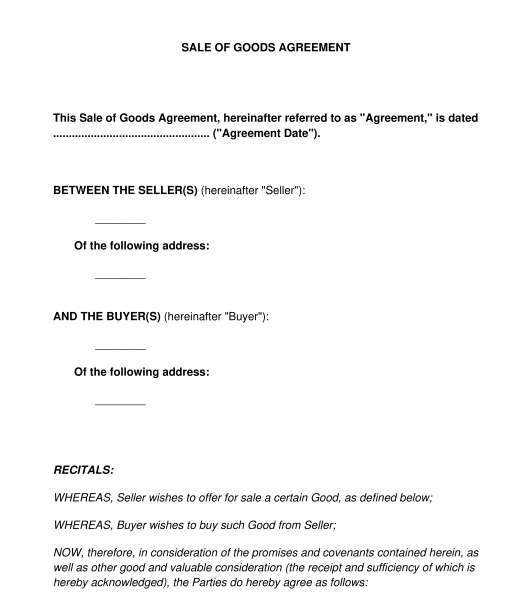 23/11/2025
23/11/2025

Answer a few questions and your document is created automatically.

Your document is ready! You will receive it in Word and PDF formats. You will be able to modify it.

 23/11/2025
23/11/2025
 Word and PDF
Word and PDF
 11 to 16 pages
11 to 16 pages



A Contract for Sale of Goods, also sometimes called a Sale of Goods Agreement, Sales Agreement or Sales Contract, is a document that a buyer and seller can enter when a certain good or certain goods are being sold. Through a Sale of Goods Agreement, a seller and buyer can outline the terms and conditions of the sale of the item or items being transferred. A Sale of Goods Agreement contains provisions about the basic logistics of the sale, like price and delivery information, but also contains the information required for an equitable relationship between the parties, such as risk of loss.
A Sale of Goods Agreement can cover the sale of any type of good, whether it's a one-time sale or multiple shipments over time. However, this contract is not designed for use in real estate transactions.
This Contract for Sale of Goods is typically used for in-person sales and is signed by both parties before the transaction.
On the other hand, the Terms and Conditions for Sale of Goods Online are agreed upon by the buyer electronically, often by checking a box on the website at the time of purchase.
This Contract for Sale of Goods is a general contract that can be used for a wide range of goods such as equipment, machinery, furniture or electronic goods.
Our Vehicle Sale Agreement is more tailored for vehicle sales - and includes space to include details such as registration numbers, VIN numbers, odometer readings and other similar relevant information.
This Sale of Goods Agreement is sometimes confused with a Bill of Sale. The two documents look quite similar, but serve different purposes. This Sale of Goods Agreement is generally signed and exchanged between the parties ahead of time. By signing the document, the parties are agreeing that on some future date, the buyer will pay the agreed price for the goods, and the seller will hand the goods over to the buyer.
Alternatively, a Bill of Sale is generally handed over at the time that the goods actually become the property of the buyer (for example, when the buyer receives the goods). The Bill of Sale serves as a proof of purchase for the buyer, and confirms that the buyer has actually paid for the goods, and is now the owner of the goods.
We have a template Bill of Sale available.
No, it is not mandatory to have a written Contract for Sale of Goods. However, it is strongly recommended to have one, as a written agreement can help ensure that both parties are on the same page regarding the transaction. It also protects both parties' interests in case there is some kind of dispute or disagreement regarding the goods.
Before purchasing goods, it is recommended that the buyer conducts some due diligence. This could include having the goods inspected, or in some cases, checking the Personal Property Securities Register to see if there are any loans secured against the goods.
Once the document has been prepared and before it is signed, it can be reviewed by the parties so that they can check that their details are correct and can make sure that they are happy with the various terms.
Both parties may then sign and date the document. If the parties are individual persons, they may have their signatures witnessed by independent adult witnesses (they should be at least 18 years old and should not witness each other). If either party is a company, then they may need to consider the laws regarding how a company must sign an Agreement (discussed below).
Both parties should then keep a copy of the document for their own records.
No, witnesses are not mandatory for a Contract for Sale of Goods, but they are useful for evidentiary purposes. If there is ever a dispute over the Contract, witnesses can help to prove that each party's signature is valid.
Witnesses should be independent adults (aged over 18), who have the mental capacity to understand what they are doing. They should not be related to one of the parties.
A Contract for Sale of Goods should contain the relevant details of the transaction, including:
Sale of Goods Agreements in Australia are subject to general principles of contract law.
If goods are being sold to the public, then the Australian Consumer Law which is set out in the Competition and Consumer Act 2010 (Commonwealth), may also be relevant. The Australian Government provides a lot of guidance about consumer contracts, covering such matters as consumer guarantees and unfair contract terms, on its Australian Consumer Law website.
Importantly, if the Australian Consumer Law applies, and if seller is providing any warranties against defects in relation to the goods, then the Australian Consumer Law requires these warranties to be presented in a certain way, and to include certain information. There are penalties for failure to do this. If in doubt, seek legal advice.
Each state and territory of Australia has a version of a Sale of Goods Act, which may also apply.
If either party is a company, then they may need to consider section 127(1) of the Corporations Act 2001 (Commonwealth), which specifies how a company must sign an Agreement. Failure to comply with that legislation may mean that this Agreement is not legally binding.
You fill out a form. The document is created before your eyes as you respond to the questions.
At the end, you receive it in Word and PDF formats. You can modify it and reuse it.
Guides to help you
Contract for Sale of Goods - sample template
Country: Australia